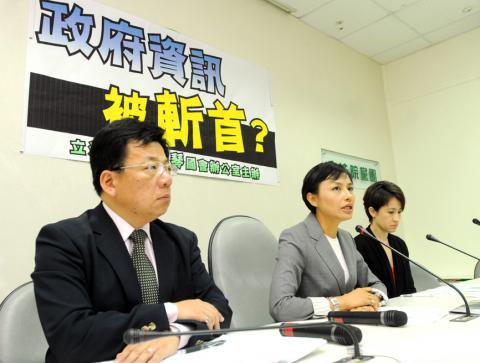|
Official confirms
cyberattack on system
NO PANIC: While officials said no confidential
information was stolen, DPP legislators said the government’s unprofessional
nomination of officials caused the security lapse
By Shih Hsiu-chuan and Chris Wang / Staff reporters

Democratic Progressive Party
legislators Lee Chun-yi, left, Chiu Yi-ying, center, and Hsiao Bi-khim, right,
talk during a press conference about online government documents being hacked
into in the Legislative Yuan yesterday. They said the government should look
into the personnel responsible for the problem.
Photo: Wang Yi-sung, Taipei Times
The government experienced a cyberattack
on the electronic interchange system for official documents early this month,
but no confidential information was stolen, an Executive Yuan official confirmed
yesterday following local media reports.
While keeping mum on its findings in tracing the hacking, the Executive Yuan’s
Office of Information and Communication Security said it has ruled out hackers
in the Philippines, who earlier this month used denial-of-service attacks to
crash the Web sites of several government departments when tensions between the
two countries were running high following the fatal shooting of a Taiwanese
fisherman by Philippine Coast Guard personnel.
“We have no comment on suspected hackers. We are still looking into that,” a
staff member at the office, who declined to be named, said yesterday.
Asked if the hackers were traced to China, the staff member also declined to
comment.
The electronic interchange for official documents, administered by the National
Archive Administration, allows government organizations at all levels, as well
as schools, to transmit official documents via the network in the form of
electronic files.
Office of Information and Communication Security Director Hsiao Hsiu-ching (蕭秀琴)
said the office discovered that abnormal events were occurring on client
computers outside the domain earlier this month and found that it was a result
of a new type of malware installed on the computers.
The office will complete a network restructuring by the end of this month to
prevent malware-related threats to the system, she said.
Hsiao said the office was still looking into whether any government documents
had been stolen before the attack was detected by the office, but said that
documents on the system did not contain confidential information.
Documents classified as “confidential” and “top secret” are transported in
printed form and only “unclassified” documents are transmitted through the
system, she added.
Democratic Progressive Party (DPP) lawmakers yesterday said the security flaw
could be attributed to the government’s personnel arrangements, lack of
understanding of modern cyberwarfare and insufficient planning of the
cybersecurity system.
President Ma Ying-jeou’s (馬英九) administration’s unprofessional nomination of
agency officials was why the government has been either inactive in responding
to the threats, or adopting insufficient and incorrect measures in countering
the hacking threat, DPP Legislator Lee Chun-yi (李俊俋) told a press conference.
According to Lee, Hsiao is an expert in agricultural economy with no background
in information and communication.
Hsiao was not alone, he added, as the director of the Executive Yuan’s Office of
Homeland Security, Chen Hui-ying (陳會英), specializes in cultural and education
studies across the Taiwan Strait, but has been put in charge of homeland
security.
“Cybersecurity has been seen by many countries as a priority. While the US has
established a Cyber Command to plan, coordinate and integrate activities to
protect the country’s military and government networks, our administration has
been sitting idle on the issue,” DPP Legislator Hsiao Bi-khim (蕭美琴) said.
The Ma administration should immediately conduct a comprehensive review of
regulations, laws, government personnel assignment and agency hierarchy related
to cybersecurity, she added.
|
![]()
![]()
![]()